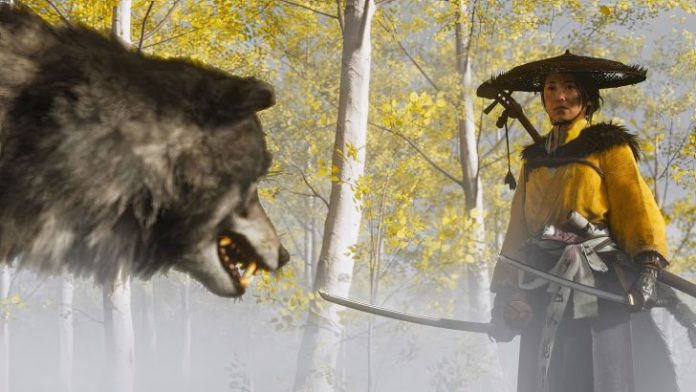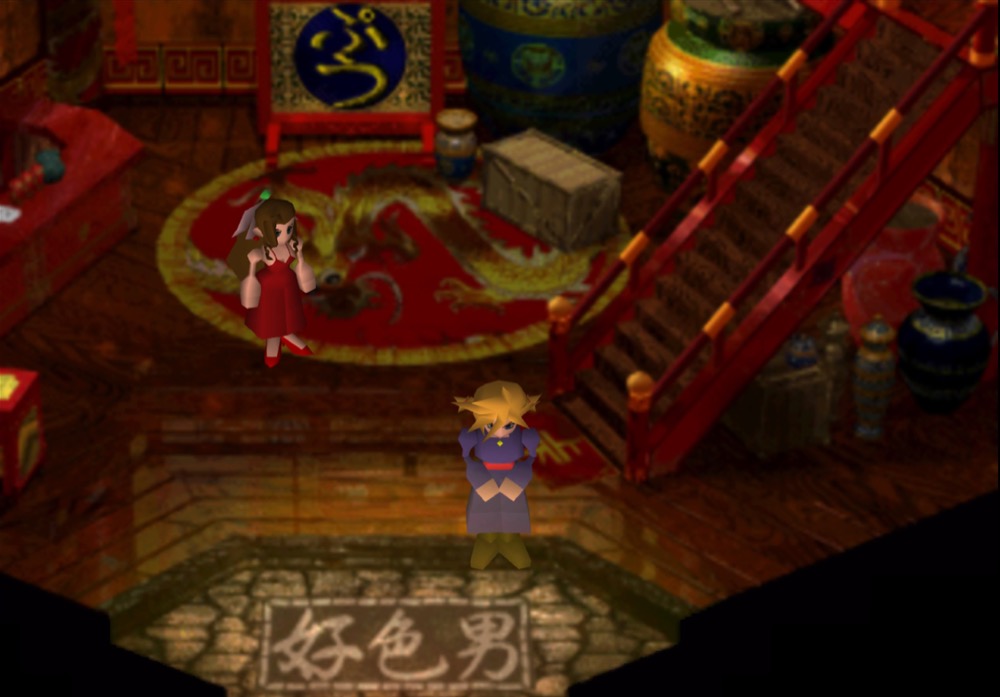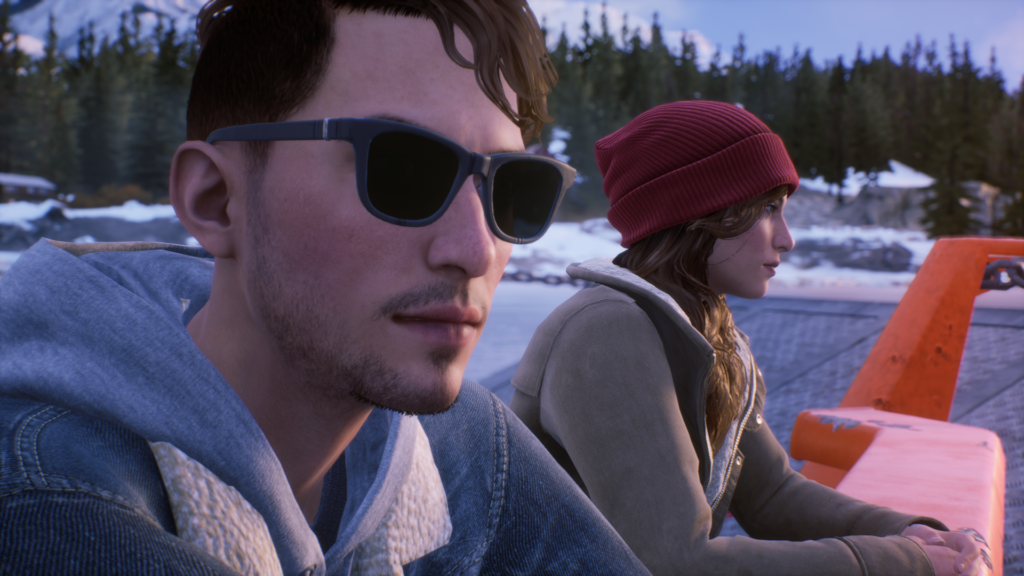
Following the announcement of Erika Ishii’s role in Ghost of Yōtei and predictable backlash centering on queerness in video games from a certain squalid corner of the internet I saw a thread by Ciarán Strange (voice of Lor and Paladin Mike in the Borderlands series) that felt like he had a lot more to say. To my great appreciation, Ciarán Strange writes;
Decades before every announcement featuring an LGBTQ+ actor or character awoke a frenzied hydra of rage across the Internet, queerness in video games was already a somewhat common theme and people didn’t treat it like an attack on video gaming as we know it.
I was about twelve years old the first time I ever set foot in the Wall Market, a seedy shopping complex with a “red light district” ran by criminals in Final Fantasy VII, as Cloud Strife. If I’d grown up in a picket-fenced Midwestern suburb instead of a poky English fishing village, and were it 2020 instead of 2002, I may have had a parent (or raging horde of angry @usernames) concerned at “my being exposed to sexual content at such a tender age”.
But I knew what sex was. I knew what sex work was. While fun in a grown-up and kinda scary way, the sexual themes weren’t what grabbed my attention and held it. And having grown up with drag queens such as Lily Savage, Dame Edna, and Bugs Bunny on the telly, it wasn’t even the crossdressing.
It was Cloud’s reaction to it all.

Even long before this moment, with next to no trans masculine representation in the media (or trans anything other than the occasional offensive trans femme caricature) — I knew I wasn’t really a girl. Not on the inside. I knew every day, as I threw the boys’ version of our school uniform over a skate tee and sports bra, and frustratedly bundled my untenable mop of hair back into a bun so I could forget its very existence. I knew when the class was split into girls and boys, and I felt like I was on the wrong side of the room. I knew when, as video games developed and more began giving me the option to play as a female character, and I continued to select a male.
I knew, like so many other trans kids knew. I just lacked the language, the verbiage, to express it.
Cloud in the Wall Market is one of those moments of queerness in video games that formed core memories shared by so many of us the trans community, regardless of our AGAB.
For me, it was his resistance to putting on a dress and high heels (and the unwelcome compliments he received when he did) that I felt reflected in my own life, having been forced to do the same recently for my granddad’s remarriage. But I’ve also spoken to countless women who found themselves in the otherwise hopeless place that is Sector 6, reading Cloud’s story from the polar opposite side of the coin. And to me, there’s something truly beautiful about a single instant in gaming history resonating with so many of us through lenses of varying colours.
We all awakened, together, in that moment. It’s something we’ve shared since before we even met.
Fast forward 22 years, and within the very same franchise, we can listen to Sena Bryer as Wuk Lamat in FFXIV — the unicorn casting of a trans woman in a big female role. Indie dating sims such as Monster Prom (and sequels), Dream Daddy, and ValiDate are helping lead the charge on romantic inclusivity. And while there’s still a lack of categorically queer content in our media, queerness in video games is leaps ahead of where it was when I was growing up.
We have trans and non-binary characters who exist simply as part of a much larger world, such as Catalyst (APEX Legends), Nimbus (Destiny 2), and Lor/Paladin Mike (Borderlands 3/Tiny Tina’s Wonderlands). We have games where you can play as a trans character and delve into their story and psyche, like Tyler in Tell Me Why and Madeline in Celeste. And we have other games, including I Was A Teenage Exocolonist, which approach gender with more fluid sensibilities.

Our character creation mechanics have also evolved. Baldur’s Gate 3, Cyberpunk 2077, Splatoon 3, Tiny Tina’s Wonderlands, and others have abolished binary-driven language in favour of simplicity via neutrality, such as body shape and vocal pitch sliders, and traits named “A/B” instead of “Male/Female”. These changes give all individuals who love customization considerably greater flexibility with their choices, regardless of gender identity.
Pair this with VTubing, an unsurprisingly intersectional area of content creation (which, to borrow a line from a movie, allows us to embody a “projection of our digital selves”), and queer gamers suddenly have a variety of options at our fingertips like we’ve never seen before. And from streaming our own content to supporting trans and non-binary VTubers like Mimcubus, Sylla Aria, and Bo Sheep, we seem to be taking full advantage and thriving as a community — regardless of (or perhaps in spite of) the increasingly aggressive tactics of anti-queer crusaders.
Access and availability of queerness in video games has developed and changed over the decades, but the community itself hasn’t. Queer developers have always existed in this industry.
While I was doing my Twilight Zone bit with Cloud back in 2002, David Gaider was actively shaping the writing and narrative design aspect of the industry out of Edmonton, Canada. At that same moment, Rebecca Heineman — having already been crowned the first ever national video game champion almost 22 years prior — was CEO of Contraband Entertainment and future senior engineer for multiple software and game developers (including Microsoft, Sony, and Electronic Arts). Danielle Bunten-Berry brought joy to millions via the games she developed, a career born out of her own love for socializing by playing games in her youth. And I could continue referencing other LGBTQ+ people who’ve influenced and advanced the gaming industry, from Jamie Fenton to Tim Cain to Maddy Thorson to Austin Walker to Robert Yang to Kristi Jimenez to Lena Raine to Mattie Brice to Kris Wise…
The list goes on. And it includes many who were perhaps never able to come out… or haven’t been able to yet.
The world has progressed since personal computers and gaming consoles were born and became commonplace in the 80s and 90s. But minority voices have always been a huge part of the innovation of video games — among them, queer voices. And not only did LGBTQ+ people work on pioneering these games. They played them, too.
Whether it’s via Cloud Strife (or any of the other arguably queer-coded characters in Final Fantasy games), Bridget of the Guilty Gear series, Leo from Tekken 6, Flea from Chrono Trigger, Vivian in the Super Mario franchise, or even spending some time in Create-A-Sim mode — trans kids, like all kids, have been discovering themselves through video games for almost half a century. And our allies have been there over the decades, celebrating (and, when necessary, chiding) these games alongside us, developing a sense of empathy and understanding as they helped our stories unfold.
Today, those same gamers are part of today’s generation of developers. These are the people who are building, writing, coding, casting, and producing today’s new games. Which, when you really think about it, makes it easier to understand why we’re seeing an uptick in diversely-populated and -storied games. Gamers are doing what gamers have always done: creating the games they enjoy. The games they want to play, that they wish had been around when they were growing up.
Earlier this year (February 2024), GLAAD and Neilsen teamed up to produce their first ever inclusivity report, which found that 17% (just over one out of six) gamers aged 13 to 55 identify as LGBTQ+. According to a 2022 Gallup poll, 7.1% of Americans consider themselves LGBTQ+. Which, with some applied mathematics, means a greater ratio of queer people in America play video games than don’t, compared to the ratio of cis-het people who play video games versus don’t. This doesn’t include how many in the latter demographic consider themselves allies (GLAAD also found in June 2023 that the number of non-queer Americans who support equal rights for their LGBTQ+ peers stands at 91%, so do with that statistic what you will).
Sadly, when you focus on the brouhaha that is social media, it’s understandable how some gamers could watch the presentations at PAX and presume queerness in video games and LGBTQ+ actors are coming out of nowhere and “woking up” the place.

When Borderlands 3 announced a new NPC Lor (née Lorelei) in 2019, it didn’t take more than a few hours for some of those who initially expressed approval to balk at the realization that the “hot British accent” actually belonged to a transgender man. And immediately, a character they’d been happy simping for minutes ago was no longer acceptable in their idea of the greater Borderlands universe.
For those who’ve never played a Borderlands game, I’ll quickly brief you that Lor is only one of a multitude of openly queer characters in the franchise. Between the refined Sir Hammerlock, alluring Mad Moxxi, strapping Mr. Torgue, and the romance of Janey and Athena, the series wasn’t hurting for rep even prior to Borderlands 3’s release. There was also an alleged coding “ope” which led to one PC, the commando Axton, flirting not only with his female party members, but male too; while writer Anthony Burch confirmed this was a gaffe, the team added dialogue in a later DLC to properly corroborate Axton’s bisexuality.
To complain about an out-and-proud transgender character in a universe where guns have legs and people form emotional (and, uh, physical) attachments with robots seems… incognizant, at best.
Final Fantasy has taken us to worlds where you can summon powerful deities, combine magic with machinery, and ride around town on an enormous (and rather talkative) equine bird. Yet enough sheer cruelty has been slung at Sena Bryer that the game’s Director, Producer, and Co-Designer Naoki “Yoshi-P” Yoshida himself came forward to make a statement of support for the EN localization team.
We have another easy example in the recent announcement of Erika Ishii as both the voice and motion capture actor for the protagonist of Ghost of Yōtei, long-awaited sequel to 2020’s Ghost of Tsushima. Ishii (who identifies as genderfluid and has no preference regarding pronouns) is both a prolific voice actor and tabletop gamer, with almost 150 credits and multiple Film Festival awards under their belt. One could see how they’d be a perfect casting choice to tackle such an action heavy and emotionally meaty role.
Very Unprepared for our charity stream, so won’t you join us and donate to @TransLifeline to get us to a nice round $30k AND gift me some buffs? https://t.co/3MAVvWUU4U pic.twitter.com/BGr3GhrSWk
— Erika Ishii (@erikaishii) June 8, 2024
The tendentious right-end of social media instead chose to launch a slew of degradation at Ishii, attacking their physical appearance and queer identity, as well as their support for the Black Lives Matter movement.
Now, I’m just a single voice in the ever-growing din of opinions out there. But over the years — the last seven or eight, especially — I’ve witnessed a massive escalation of verbal assault toward any and all diverse content in media, incluiding queerness in video games.
It may have started small, its origins more reflective of politicians and other grifters seeking to capitalize on the divide than how our fellow citizens actually feel (as the GLAAD surveys suggest). But it’s surged to such intensity that a single Black or lesbian character in a movie trailer today can ignite outrage. Everything from the option to change your character’s pronouns to the inclusion of diverse NPCs has churned up animosity and resentment, the goalposts of which seem to continuously move further and further back.
Compare the late 90s, when lads couldn’t get enough of the latest Lara Croft installment, to just this last week, when who could easily be the same lads flew off the handle upon hearing the new Ghost of game would “force them” to “play as a woman”. I can’t even imagine the uproar if the critically acclaimed 2013 reboot of Tomb Raider was announced tomorrow.
I’ve witnessed this acceleration of bigotry, as I’m sure many of you have, too. Seeds of vitriol have germinated into outright hostility, and the detachment and anonymity of social media (plus easy “access” to those working in the industry via said socials) provides a pretty convenient outlet. And it’s come to such a boiling point that, whether the character you’re playing is queer or not, working in this industry as a transgender/non-binary actor can feel, if not impossible, completely exhausting. On top of a lack of casting opportunities, the constant backlash against us for daring to exist (let alone publicly) is arduous.
And yet, we endure, as do our peers of other minority groups, because we love what we do. We love to act, we love to perform. And we love video games.
There is a beautiful shimmer of irony in the situation, however.
When I was recording for Borderlands 3 at Gearbox, I was given a little tour of their studios, and I got to meet a ton of the devs who were laboring over scripts, code, cutscenes, environments, mo-cap, foley, and everything else you can imagine that goes into creating the interactive experience.
I was astounded by how many LGBTQ+ employees were working on the game — by the diversity of the company in general. In the booth and via DM, we were building something with Lor’s story we felt really good about. But knowing that — beyond my involvement — queer devs all around the company were having a hand in bringing him to life? That was something incredibly special, and something I will always hold onto dearly.
It really drove home for me that all of these progressive characters and plots and games are created by people who identify with them on a personal level. Behind queer characters aren’t just queer actors — it’s queer writers, concept artists, modelers, programmers, musicians, PR staff, QA, you name it. From the birth of an idea all the way through post-launch, diverse professionals populate every department of video game development. And the devs themselves are reflected in every game we have the joy and the privilege of getting to play.
Queerness in video games is nothing new. There really are only three differences between this century and the last:
First off, fewer people feel the need to hide their true selves due to legislative and societal changes which, while far from perfect, have made “coming out” considerably less ruinous than it was in the 80s–00s. Queer folk are also discovering themselves earlier in life, meaning they may already be “out” upon entering a relatively less discriminatory career field.
Secondly, as I’ve already gushed over, is the slow but steady evolution of queerness in video games and especially the inclusion of LGBTQ+ characters played by LGBTQ+ actors. There are even full games following transgender journeys. It’s incredible to glance over my shoulder and see how we’ve gone from Poison to Catalyst in the span of my own lifetime.
And last is the increasing levels of pushback from an indignant minority who’ve gone from despising trans inclusion, to despising gay inclusion, to despising any character who isn’t cis, white, hetero, and (often) male.
Astroturfing bots and celebrity grifters continue to churn up manufactured outrage, targeting young men who fear society is leaving them behind and tugging on those exact fears to elicit a vicious, even violent reaction. Now, not only are they not “welcome” in reality, they also no longer “belong” in their safe haven… or so they’ve been convinced by the content fed to them by social media algorithms. They feel a false threat of disenfranchisement lurking on the horizon for the first time — which, while I deeply empathize, cannot take priority over the actual disenfranchisement which continues to affect minorities.
It’s definitely a curious study, especially considering those on the extreme fringes of this acrimony were raised alongside us. We grew up playing the same video games, but it seems some of us may have taken their lessons a bit more to heart.
Many of those calling for our outright exile from society have also strolled through the Wall Market with Cloud, comforted Vivian after her sisters’ cruelty, or aided Sir Hammerlock in plagiarizing his ex-boyfriend’s research.
None of these moments of queerness in video games have ever erased the cishet experience from the world — they simply allowed it to walk hand-in-hand with a friend.










